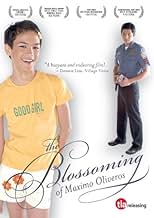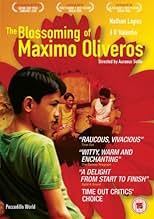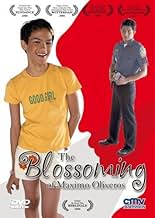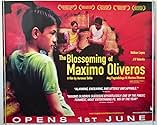L'éveil de Maximo Oliveros
Titre original : Ang pagdadalaga ni Maximo Oliveros
- 2005
- Tous publics
- 1h 40min
NOTE IMDb
7,0/10
1,7 k
MA NOTE
Ajouter une intrigue dans votre langueA young boy falls in love with a handsome policeman who is investigating his family's criminal activities.A young boy falls in love with a handsome policeman who is investigating his family's criminal activities.A young boy falls in love with a handsome policeman who is investigating his family's criminal activities.
- Réalisation
- Scénario
- Casting principal
- Récompenses
- 24 victoires et 28 nominations au total
JR Valentin
- Victor Perez
- (as J.R. Valentin)
Jett Desalesa
- Leslie - Maxi's friend
- (as Sir Jett Desalesa)
Avis à la une
This film tells the story of a young effeminate boy from a criminal family, who falls for a hunky local policeman in a deprived part of Manila.
A young transvestite boy, possibly transgendered as well,falling in love with a policeman. And it is hinted that the policeman has equal feelings towards him too! I would have thought such a topic should be taboo. The family is so accepting of Maximos that I find it really touching. I am quite in awe that the Filipino society is so accepting of the gay and transgender people.
As for the film, they use loads of natural lighting almost exclusively, so scenes are too dark most of the time. There is even a scene when the family watches TV without lights on! And they did not use a wide enough lens to film scenes in the house either. But these are only minor issues. The main thing is that the story itself is beautiful and brutal at the same time. "The Blossoming of Maximo Oliveros" is quite an eye opener for me.
A young transvestite boy, possibly transgendered as well,falling in love with a policeman. And it is hinted that the policeman has equal feelings towards him too! I would have thought such a topic should be taboo. The family is so accepting of Maximos that I find it really touching. I am quite in awe that the Filipino society is so accepting of the gay and transgender people.
As for the film, they use loads of natural lighting almost exclusively, so scenes are too dark most of the time. There is even a scene when the family watches TV without lights on! And they did not use a wide enough lens to film scenes in the house either. But these are only minor issues. The main thing is that the story itself is beautiful and brutal at the same time. "The Blossoming of Maximo Oliveros" is quite an eye opener for me.
Though its a thoroughly Catholic-dominated country, the Philippines is said to have a more lax attitude towards "the gay" than other more liberal, democratic countries, like the one I live in. Many point to its cinema as evidence of this. Of course, this is from the outside looking in. LGBT folks, particularly the effeminate "bakla" male, might be commonplace in Philippine film, but the ones we don't see on screen face a particular type of oppression. They are often an object of ridicule, stereotyped as shallow, loud-talking and outrageously "mayabang," and usually sex-crazed. And a lot of folks, gay or straight, eat it up.
Despite its deceptive marketing (from the DVD cover/promo poster to the trailer), Auraeus Solito's Ang Pagdadalaga ni Maximo Oliveros/The Blossoming of Maximo Oliveros (2006) isn't at all about a flamboyantly gay boy's crush on the hunky neighborhood police officer that happens to be set in a third world barrio. The story is the barrio, and all its contradictions, initially dressed up as a neorealist comedy evoking both Lino Brocka and Bagets at once before taking a darker turn halfway through.
Like all good (worthwhile) Philippine stories, its aware of acute third world contradictions without overtly speaking on it. If Brillante Mendoza's work emphasizes people's idealism despite wretched conditions, Solito's flips the formula. His Philippines is one where the people are wretched but the settings, still unmistakably impoverished, can also be a magical, wonderfully pastel-colored place.
Maxi (Nathan Lopez) is 12-years old, gay, and plays surrogate mother to his family of petty thieves: tatay Paco (Soliman Cruz) and his older brothers Boy and Bog. The barrio is his playground, until one night he's assaulted by some knuckleheads. Policeman Victor (JR Valentin) comes to his rescue, and they become friends much to his family's objection. Matters complicate when Boy ends up killing somebody in a botched robbery attempt. Lopez brings remarkable ease to the title character, embodying urban poor Philippines with simplicity and struggle. His selfless need/want to care for others is carried by a fragile balance between a naive confidence of who he is and a growing insecurity of where he is (and where he's heading). He dreams in a bubble in the process of bursting, asking his father "Wala na bang ibang paraan itay?" (Is there no other way, dad?)
On the surface, he's nothing like his macho, gun-toting father. However, beneath the princess demeanor, he is his father's son, perhaps more so than his brothers. Conditions have forced Paco to consider what is more dignified: starving with a factory job, or getting by as a petty thief. Maxi has inherited his father's most lasting trait: a commitment to keep the family together. Or at least fed, clothed and sheltered, even if it means doing the "wrong" thing. Thus, Maxi's "blossoming" has less to do with dealing with his rejected affections for Victor and more with facing down the reality of his family's livelihood.
Restrained by necessity rather than stylistic choice, Solito shows us what could be done with a digital camera, $10,000US and 13 days of shooting. It's a style of film that can never be overdone in the Philippines, where lack of support from the media industry and government and resources forces an organic creativity.
Solito's execution is matched by writer Michiko Yamamoto's (Magnifico, 2003) gift for compact, delightful drama/comedy without teetering to far in either direction. Thanks to this collaboration, Ang Pagdadalaga ni Maximo Oliveros is a leap forward from the gay caricatures we've gotten too used to, and yet another piece of a compelling argument that Philippine cinema isn't all cornball and melodrama. Or, that a movie can still have those elements and not be shitty.
Despite its deceptive marketing (from the DVD cover/promo poster to the trailer), Auraeus Solito's Ang Pagdadalaga ni Maximo Oliveros/The Blossoming of Maximo Oliveros (2006) isn't at all about a flamboyantly gay boy's crush on the hunky neighborhood police officer that happens to be set in a third world barrio. The story is the barrio, and all its contradictions, initially dressed up as a neorealist comedy evoking both Lino Brocka and Bagets at once before taking a darker turn halfway through.
Like all good (worthwhile) Philippine stories, its aware of acute third world contradictions without overtly speaking on it. If Brillante Mendoza's work emphasizes people's idealism despite wretched conditions, Solito's flips the formula. His Philippines is one where the people are wretched but the settings, still unmistakably impoverished, can also be a magical, wonderfully pastel-colored place.
Maxi (Nathan Lopez) is 12-years old, gay, and plays surrogate mother to his family of petty thieves: tatay Paco (Soliman Cruz) and his older brothers Boy and Bog. The barrio is his playground, until one night he's assaulted by some knuckleheads. Policeman Victor (JR Valentin) comes to his rescue, and they become friends much to his family's objection. Matters complicate when Boy ends up killing somebody in a botched robbery attempt. Lopez brings remarkable ease to the title character, embodying urban poor Philippines with simplicity and struggle. His selfless need/want to care for others is carried by a fragile balance between a naive confidence of who he is and a growing insecurity of where he is (and where he's heading). He dreams in a bubble in the process of bursting, asking his father "Wala na bang ibang paraan itay?" (Is there no other way, dad?)
On the surface, he's nothing like his macho, gun-toting father. However, beneath the princess demeanor, he is his father's son, perhaps more so than his brothers. Conditions have forced Paco to consider what is more dignified: starving with a factory job, or getting by as a petty thief. Maxi has inherited his father's most lasting trait: a commitment to keep the family together. Or at least fed, clothed and sheltered, even if it means doing the "wrong" thing. Thus, Maxi's "blossoming" has less to do with dealing with his rejected affections for Victor and more with facing down the reality of his family's livelihood.
Restrained by necessity rather than stylistic choice, Solito shows us what could be done with a digital camera, $10,000US and 13 days of shooting. It's a style of film that can never be overdone in the Philippines, where lack of support from the media industry and government and resources forces an organic creativity.
Solito's execution is matched by writer Michiko Yamamoto's (Magnifico, 2003) gift for compact, delightful drama/comedy without teetering to far in either direction. Thanks to this collaboration, Ang Pagdadalaga ni Maximo Oliveros is a leap forward from the gay caricatures we've gotten too used to, and yet another piece of a compelling argument that Philippine cinema isn't all cornball and melodrama. Or, that a movie can still have those elements and not be shitty.
Is Maxi Gay? Well, he dresses like a girl and has a crush on a hunky policeman. But as the story develops one has to wonder whether Maxi is actually a gay preteen or just a troubled boy in a difficult situation. Does it matter? Not really.
After the death of his mother due to an unknown illness Maxi has taken over her role in taking care of his two brothers and father, all petty thieves. The arrangement seems to work fine. Maxi delights in cooking and cleaning for his family and enjoys a playing Miss Phillipines with his "girl" friends. But everything changes when a hunky young cop arrives. Maxi develops a crush and is forced to choose between his family and his feelings for the cop. Needless to say thinks get complicated and even turn ugly and violent.
This film impressed me when I saw it at a screening at the International Filmfestival Rotterdam. There are faults but mainly the film is strong and well executed. The acting is impressive, although Maxi starts out a bit of a stereotypical screaming queen.
If anything the film is a bit too long, there are several moments that could be deleted without much effect. Also the quality of the picture and sound is understandably not up to western standards, although this does not distract from the story and I have seen much worse.
One of the questions I am left with is whether this accurately portrays Philipine's attitude towards (effeminate) homosexuality. If so that is to be commended, however it is hard to imagine such utter and complete tolerance, not only of Maxi but also of his friends. In a film with such a premise one sort of expects some exploration of the subject. However the lack thereof does not affect the story, it may even make it stronger.
I hope you will go see this movie, if you get the chance!
After the death of his mother due to an unknown illness Maxi has taken over her role in taking care of his two brothers and father, all petty thieves. The arrangement seems to work fine. Maxi delights in cooking and cleaning for his family and enjoys a playing Miss Phillipines with his "girl" friends. But everything changes when a hunky young cop arrives. Maxi develops a crush and is forced to choose between his family and his feelings for the cop. Needless to say thinks get complicated and even turn ugly and violent.
This film impressed me when I saw it at a screening at the International Filmfestival Rotterdam. There are faults but mainly the film is strong and well executed. The acting is impressive, although Maxi starts out a bit of a stereotypical screaming queen.
If anything the film is a bit too long, there are several moments that could be deleted without much effect. Also the quality of the picture and sound is understandably not up to western standards, although this does not distract from the story and I have seen much worse.
One of the questions I am left with is whether this accurately portrays Philipine's attitude towards (effeminate) homosexuality. If so that is to be commended, however it is hard to imagine such utter and complete tolerance, not only of Maxi but also of his friends. In a film with such a premise one sort of expects some exploration of the subject. However the lack thereof does not affect the story, it may even make it stronger.
I hope you will go see this movie, if you get the chance!
Regardless the controversial topic and my non-knowledge of the reality of those events (for example, volume of corruption within police and acceptance of gays in the Phillippines), as for a film as such, it was skilfully accomplished: good/great performances by major actors, versatile direction and appropriate choice of music made Ang pagdadalaga ni Maximo Oliveros a smooth watch.
Due to limited space and time, however, the film had several documentary elements, and several events happening in the dark did not allow to follow them carefully (perhaps by virtue of modest technology used?). Thus, not a total contentment for me, but definitely a distinguishing and challenging creation to be screened in various festivals.
Due to limited space and time, however, the film had several documentary elements, and several events happening in the dark did not allow to follow them carefully (perhaps by virtue of modest technology used?). Thus, not a total contentment for me, but definitely a distinguishing and challenging creation to be screened in various festivals.
One can seldom discuss gay Filipino films without mentioning the Lino Brocka classic, "Macho Dancer". For a long time the film lorded over all the others in gay filmdom (or is it 'film gaydom'?). Sure there were competent ones like "Aishite Masu" and "Markova: Comfort Gay" but they were never thisclose to "Macho". Could "Ang Pagdadalaga ni Maximo Oliveros" finally be the one true contender for the throne?
Director Aureus Solito and writer Michiko Yamamoto have crafted a very likable coming of age story. The treatment of Maximo Oliveros' (Nathan Lopez) homosexuality is unique and refreshing for it is never questioned nor made an issue, just a fact as true as the sky is blue. It's a huge credit to the filmmakers for not resorting to easy laughs at the expense of gay characters. Camp is absolutely present but it's never overdone. In fact, I think one of the main reasons why the film works so well is because the whole film isn't overdone. The filmmakers know when to pull back just before a scene turns mushy or heavyhanded. Even something as elaborate as the mini-pageant scene is cut long enough to avoid unnecessary melodrama.
One of the film's most interesting aspects for a lot of viewers is the seemingly astonishing possibility that an effeminate homosexual can exist relatively peacefully in the slums, aka Hoodlum Central. Although I haven't seen this myself, I am convinced that cultural mores make this scenario very possible. Despite the influence of homophobic Roman Catholicism, the general mood in the country is situated somewhere between amusement, acceptance, and tolerance (though not immune to occasional spurts of homophobia). Let us not forget that pre-Spanish Philippine culture respected the 'babaylan', a gay priest(ess) of sorts.
The homoerotic love angle is beautifully handled, in my opinion. To start with, the leads are perfect. Lopez carries the film as Maximo while JR Valentin as the cop is hunky yet brotherly, respectable as necessary but not too antiseptic. You get a sense of hero worship, excessive caring, and strong attraction from the side of Maximo while from the other side you see a fraternal sense of caring, naivete, and a culturally-imbibed politeness that supersedes any possible homophobia. There's also a delicious hint of ambiguity in his sexuality. There are a number of memorable scenes between the two, but a brief, well-handled, but highly erotic one (which, under a weaker filmmaker, could've easily bordered on pedophilia considering Maximo's age) and the emotionally satisfying ending stand out the most.
Despite the fact that Maximo Oliveros is unapologetically gay the film isn't strictly gay-themed unless you consider puppy love, unrequited love, familial obligations, and economic struggles as such.
It was a proud moment to watch a Filipino film in the prestigious Lincoln Center New Films/New Directors series in New York City. It was icing on the cake to see someone from the Univ. of the Philippines do good, in the gay arena, no less. "As good as Hollywood films"? I say better. When did Hollywood ever show us a coming of age story with a gay lead character?
Director Aureus Solito and writer Michiko Yamamoto have crafted a very likable coming of age story. The treatment of Maximo Oliveros' (Nathan Lopez) homosexuality is unique and refreshing for it is never questioned nor made an issue, just a fact as true as the sky is blue. It's a huge credit to the filmmakers for not resorting to easy laughs at the expense of gay characters. Camp is absolutely present but it's never overdone. In fact, I think one of the main reasons why the film works so well is because the whole film isn't overdone. The filmmakers know when to pull back just before a scene turns mushy or heavyhanded. Even something as elaborate as the mini-pageant scene is cut long enough to avoid unnecessary melodrama.
One of the film's most interesting aspects for a lot of viewers is the seemingly astonishing possibility that an effeminate homosexual can exist relatively peacefully in the slums, aka Hoodlum Central. Although I haven't seen this myself, I am convinced that cultural mores make this scenario very possible. Despite the influence of homophobic Roman Catholicism, the general mood in the country is situated somewhere between amusement, acceptance, and tolerance (though not immune to occasional spurts of homophobia). Let us not forget that pre-Spanish Philippine culture respected the 'babaylan', a gay priest(ess) of sorts.
The homoerotic love angle is beautifully handled, in my opinion. To start with, the leads are perfect. Lopez carries the film as Maximo while JR Valentin as the cop is hunky yet brotherly, respectable as necessary but not too antiseptic. You get a sense of hero worship, excessive caring, and strong attraction from the side of Maximo while from the other side you see a fraternal sense of caring, naivete, and a culturally-imbibed politeness that supersedes any possible homophobia. There's also a delicious hint of ambiguity in his sexuality. There are a number of memorable scenes between the two, but a brief, well-handled, but highly erotic one (which, under a weaker filmmaker, could've easily bordered on pedophilia considering Maximo's age) and the emotionally satisfying ending stand out the most.
Despite the fact that Maximo Oliveros is unapologetically gay the film isn't strictly gay-themed unless you consider puppy love, unrequited love, familial obligations, and economic struggles as such.
It was a proud moment to watch a Filipino film in the prestigious Lincoln Center New Films/New Directors series in New York City. It was icing on the cake to see someone from the Univ. of the Philippines do good, in the gay arena, no less. "As good as Hollywood films"? I say better. When did Hollywood ever show us a coming of age story with a gay lead character?
Le saviez-vous
- AnecdotesJoey Pepe Smith who plays the piano man being teased by the kids is the one who scored the film.
- ConnexionsReferenced in Ako ang simula: The ABS-CBN News and Current Affairs Yearend Special (2006)
- Bandes originalesMy Country, My Philippines
Written and Performed by Yoyoy Villame
Meilleurs choix
Connectez-vous pour évaluer et suivre la liste de favoris afin de recevoir des recommandations personnalisées
- How long is The Blossoming of Maximo Oliveros?Alimenté par Alexa
Détails
- Date de sortie
- Pays d’origine
- Sites officiels
- Langues
- Aussi connu sous le nom de
- The Blossoming of Maximo Oliveros
- Lieux de tournage
- Sociétés de production
- Voir plus de crédits d'entreprise sur IMDbPro
Box-office
- Montant brut aux États-Unis et au Canada
- 28 041 $US
- Week-end de sortie aux États-Unis et au Canada
- 6 690 $US
- 24 sept. 2006
- Montant brut mondial
- 38 691 $US
- Durée
- 1h 40min(100 min)
- Couleur
Contribuer à cette page
Suggérer une modification ou ajouter du contenu manquant

























